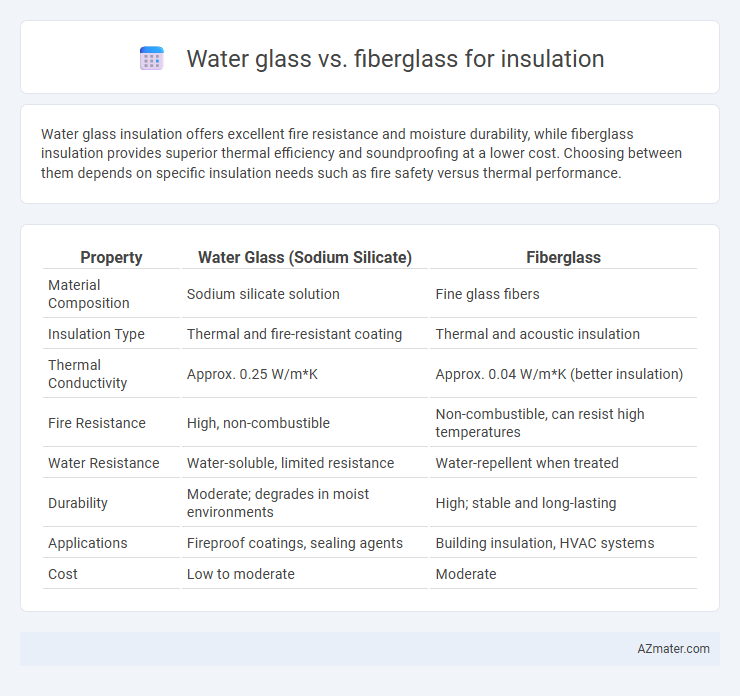Water glass insulation offers excellent fire resistance and moisture durability, while fiberglass insulation provides superior thermal efficiency and soundproofing at a lower cost. Choosing between them depends on specific insulation needs such as fire safety versus thermal performance.
Table of Comparison
| Property | Water Glass (Sodium Silicate) | Fiberglass |
|---|---|---|
| Material Composition | Sodium silicate solution | Fine glass fibers |
| Insulation Type | Thermal and fire-resistant coating | Thermal and acoustic insulation |
| Thermal Conductivity | Approx. 0.25 W/m*K | Approx. 0.04 W/m*K (better insulation) |
| Fire Resistance | High, non-combustible | Non-combustible, can resist high temperatures |
| Water Resistance | Water-soluble, limited resistance | Water-repellent when treated |
| Durability | Moderate; degrades in moist environments | High; stable and long-lasting |
| Applications | Fireproof coatings, sealing agents | Building insulation, HVAC systems |
| Cost | Low to moderate | Moderate |
Introduction to Insulation Materials
Water glass insulation, also known as sodium silicate, offers excellent fire resistance and moisture protection properties, making it suitable for high-temperature applications. Fiberglass insulation consists of fine glass fibers that provide efficient thermal and acoustic insulation, commonly used in residential and commercial buildings. Both materials have distinct advantages: water glass excels in durability and sealing against moisture, while fiberglass is valued for its cost-effectiveness and ease of installation.
What is Water Glass Insulation?
Water glass insulation, also known as sodium silicate insulation, is a thermal protection material made from a solution of sodium silicate and water that forms a glass-like, fire-resistant coating when applied. It provides excellent heat resistance and is commonly used in furnace linings, fireproofing, and high-temperature insulation applications. Unlike fiberglass, which is composed of fine glass fibers, water glass insulation offers a rigid, durable barrier that resists moisture and chemical degradation.
What is Fiberglass Insulation?
Fiberglass insulation consists of fine glass fibers woven into a material that traps air, reducing heat transfer and providing excellent thermal resistance. It is widely used due to its affordability, fire resistance, and soundproofing properties, commonly found in walls, attics, and HVAC systems. Compared to water glass insulation, fiberglass offers superior durability and moisture resistance when properly installed.
Thermal Performance Comparison
Water glass insulation offers moderate thermal resistance with an R-value typically around 3.5 per inch, providing effective heat retention and moisture resistance. Fiberglass insulation generally achieves higher thermal performance, with R-values ranging from 2.9 to 4.3 per inch depending on density, excelling in reducing heat transfer through walls and attics. Comparing both, fiberglass is often preferred for superior insulation efficiency, while water glass provides added benefits in fire resistance and durability under specific applications.
Moisture Resistance and Durability
Water glass insulation offers superior moisture resistance due to its silica-based composition, which prevents water absorption and reduces mold growth. Fiberglass insulation, while effective thermally, is prone to moisture retention that can lead to deterioration and decreased insulating performance over time. The durability of water glass insulation surpasses fiberglass in humid environments, maintaining structural integrity and insulation value longer under moisture exposure.
Fire Safety and Chemical Stability
Water glass insulation demonstrates superior fire safety due to its inorganic composition, which resists combustion and withstands high temperatures without emitting toxic fumes. Fiberglass insulation, while effective in thermal performance, can degrade under fire exposure and release irritant particles or fumes. Chemically, water glass remains stable and non-reactive over time, maintaining its insulating properties, whereas fiberglass may deteriorate when exposed to moisture or chemicals, potentially compromising its efficacy.
Installation Process and Ease
Water glass insulation typically requires mixing sodium silicate with other components, demanding precise handling and curing times that can extend installation duration. Fiberglass insulation involves straightforward cutting and fitting into wall cavities, enabling quicker installation with minimal special equipment. Ease of installation favors fiberglass due to its lightweight nature and flexibility, while water glass demands careful application to ensure structural integrity and optimal thermal performance.
Environmental Impact and Sustainability
Water glass insulation, made from sodium silicate, offers low environmental impact due to its non-toxic composition and full recyclability, minimizing landfill waste. Fiberglass insulation, while effective, involves energy-intensive production and contains fine glass fibers that can pose health risks and disposal challenges. Choosing water glass enhances sustainability by supporting eco-friendly manufacturing processes and reducing harmful emissions compared to conventional fiberglass options.
Cost Analysis: Water Glass vs Fiberglass
Water glass insulation typically incurs higher initial costs due to specialized application and raw material expenses compared to fiberglass, which benefits from mass production and widespread availability, making it more cost-effective. Over time, fiberglass offers lower maintenance and replacement costs, contributing to its overall affordability for residential and commercial insulation projects. Despite water glass's superior fire resistance and durability, the cost premium often limits its use to niche or high-performance insulation applications.
Choosing the Right Insulation for Your Needs
Water glass insulation offers excellent fire resistance and moisture barrier properties, making it ideal for applications requiring high thermal protection and durability. Fiberglass insulation provides superior soundproofing and is cost-effective, best suited for residential and commercial buildings focused on energy efficiency and noise reduction. Evaluating factors such as thermal performance, environmental impact, and installation requirements helps determine the optimal insulation material tailored to your specific needs.

Infographic: Water glass vs Fiberglass for Insulation
 azmater.com
azmater.com